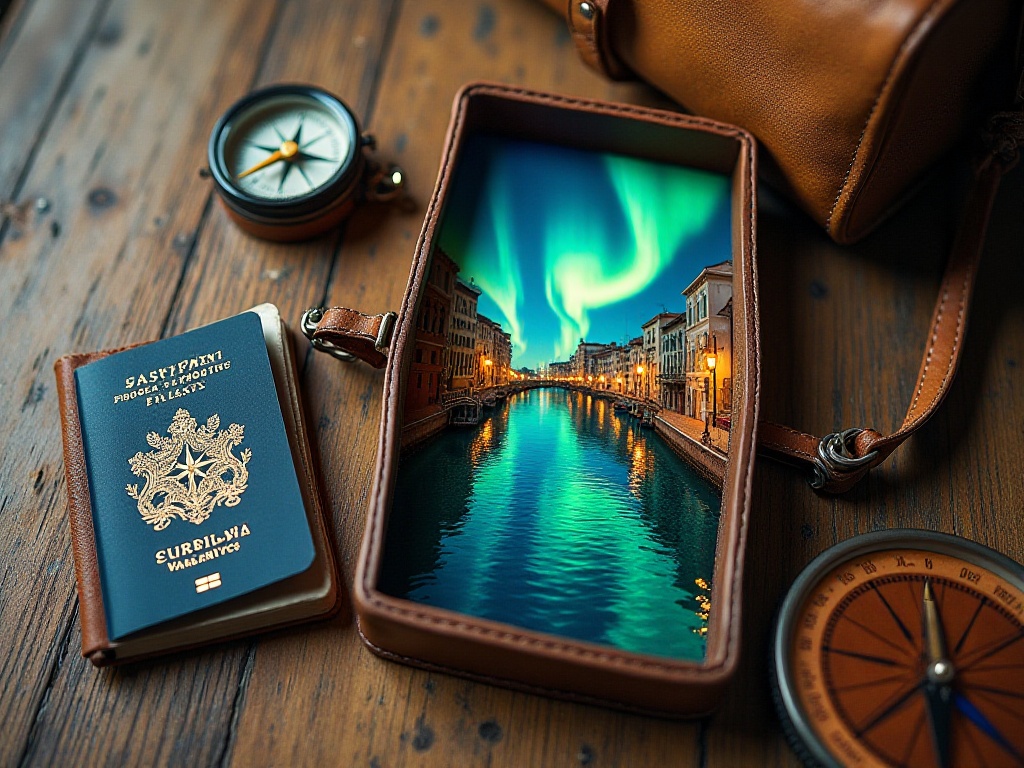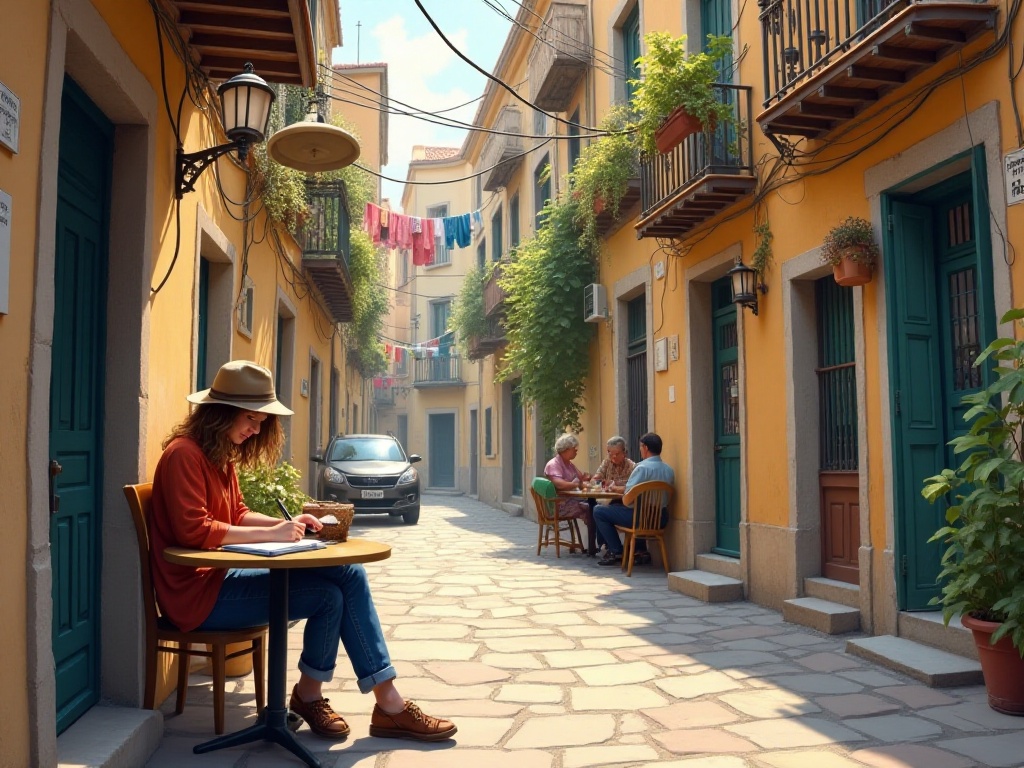Hello everyone, I'm your travel planner. Today I'll share a super practical topic - how to plan a perfect international trip. As a seasoned traveler who has visited over 30 countries, I deeply understand the anxiety and confusion of first-time international travelers.
To be honest, I was also quite flustered during my first international trip, spending a lot of time just preparing documents. I was both nervous and excited then, worried about missing something important. However, after so many travel experiences, I've now developed a reliable set of travel preparation methods. Let me guide you through making travel planning simple and fun, step by step.
When it comes to international travel, documents are probably the most headache-inducing part. I remember running back and forth several times when getting my first passport because the photo wasn't qualified - it was literally a waste of life. So first, let's talk about this important matter of document preparation.
According to the latest U.S. government data, over 40% of passport applications worldwide were returned in 2024 due to unqualified photos. This is no joke, so special attention must be paid when taking passport photos. First, the background must be pure white, without any shadows or wrinkles; second, facial expression should be natural, no teeth showing when smiling; third, hair shouldn't cover eyebrows and ears, better to brush bangs up; lastly, no jewelry, and glasses should preferably be removed.
Besides passports, visas are another important step. Visa requirements vary greatly between countries - some require bank statements, employment certificates, and itineraries, while others are relatively simple. I suggest starting visa preparation at least 3 months in advance, as some countries have longer processing times. For example, applying for a French visa now typically requires booking 45 days in advance.
One tip is to make two copies of all documents when preparing visa materials. One for application, another as backup, in case of loss or if additional materials are requested. I once had an experience where the visa center lost part of my materials, thankfully I had backups, otherwise I would have had to collect everything again.

Regarding money matters, I have an unexpected suggestion - increase your budget by 30%. Why? According to 2024 World Tourism Organization data, over 65% of travelers encounter troubles during their journey due to underestimating their budget.
I learned this lesson the hard way during my first trip to Europe. I thought 1000 euros would be enough for two weeks, but ended up spending 700 in the first week, forcing me to survive on bread and water for the remaining days. Looking back, those days of extreme budgeting were really painful. Now for each trip, I prepare a dedicated travel credit card and carry some cash for emergencies.
Speaking of credit cards, I strongly recommend getting one with no foreign transaction fees. Many banks now offer such products, like certain banks' global payment cards that not only have no foreign transaction fees but also offer airport lounge access and car rental discounts. I personally have two credit cards from different banks, partly as backup and partly to maximize different card benefits.
Regarding currency exchange, I suggest not exchanging too much money domestically. Firstly, the exchange rate isn't favorable, and secondly, carrying large amounts of cash isn't very safe. A better approach is using ATMs at your destination or exchanging at local currency exchange points. However, note that some countries' ATMs might charge fees, so it's better to withdraw more at once to reduce transaction frequency.
One easily overlooked expense is tipping culture. In the U.S., tips for servers are usually 15%-20% of the bill; in Europe, generally 5%-10%; while in Japan, tipping isn't needed at all. These need to be understood in advance to avoid awkwardness or overspending.
Regarding itineraries, many people like to pack every minute full. But guess what? According to the 2024 Global Travel Satisfaction Survey, 85% of travelers say their most memorable travel experiences often come from spontaneous experiences outside of planned activities.
I suggest planning only 2-3 major attractions per day, leaving plenty of free time. This not only makes the journey more relaxing but also allows opportunities to discover hidden gems. For example, when I was in Paris, it was because I had free time that I discovered an amazing antique bookstore - it was absolutely a literary youth's paradise.
There are several tips for planning itineraries. First, pay attention to attraction opening hours - some museums have fixed closing days, and some attractions might extend hours during specific holidays. Second, consider distances between attractions, try to arrange nearby attractions for the same day. Third, be aware of local holidays, as many shops and attractions might close during holidays.
Additionally, I strongly recommend downloading some essential travel apps. Google Maps can download offline maps so you don't need to worry about network issues; TripIt can help organize your itinerary, integrating flight and hotel booking information; XE Currency allows real-time exchange rate checks for easy price calculations.
Another important reminder is not to pack your schedule too full. It's recommended to stay at least 3 days in each city to truly experience the local atmosphere. If time permits, I suggest choosing slow travel, staying longer in one place and living like a local - such travel experiences will be more profound.

Last year, I stayed at a guesthouse run by an elderly lady in Japan. Although the room wasn't big, I could enjoy her homemade wagashi every morning - an experience that five-star hotels can't provide. According to Booking.com data, over 70% of young travelers in 2024 prefer unique accommodations like guesthouses or hostels.
When choosing accommodation, besides price, many factors need consideration. First is location - better to choose places near metro stations or main attractions to save transportation time and costs. Second is safety - check the surrounding environment and avoid remote or unsafe areas. Third is facilities - if you plan to cook, ensure the place has kitchen equipment.
Many young people now like staying in hostels - besides being cheap, the biggest advantage is meeting friends from around the world. I met a German girl at a hostel in Vancouver - we hiked together, cooked together, and still keep in touch. However, be careful when choosing hostels, better check reviews, especially regarding cleanliness and safety.
If you choose hotels, I suggest registering for major hotel group membership programs. Although you might start as a regular member, with increased stays, you can enjoy upgrades, late checkout, and other privileges. Plus, many hotel group points can be redeemed for free stays - another way to save money.
For guesthouses, Airbnb now offers many choices. However, before booking, carefully read host descriptions and guest reviews. Pay special attention to check-in and check-out times, and whether additional cleaning fees are required. Some guesthouses might require passport copies - these are normal security measures.
Regarding transportation, I want to share a money-saving tip. Many don't know that booking flights 90 days in advance often saves 30%-50% on costs. According to the 2024 Global Airfare Analysis Report, travelers booking 3 months ahead save an average of 42% on airfare.
When booking flights, use multiple comparison websites as prices may vary between platforms. Also, if your schedule is flexible, consider departing on Tuesdays or Wednesdays as tickets are usually cheaper on these days. Also note connection times - if too short, there's risk of missing flights.
After reaching your destination, public transportation is the most economical choice. Many cities have tourist transit cards, like Paris's Visite Pass, offering unlimited metro and bus use. If you plan to visit multiple cities in one country, consider rail passes - like the Eurail Pass, which is a good choice.
However, sometimes taking taxis is necessary to save time. Many countries now have ride-hailing apps like Didi, usually cheaper than traditional taxis. But check reviews and choose reliable services. Also, in some countries, Uber might be illegal, so better understand local taxi rules in advance.
If you want more freedom, consider renting a car. However, note that many countries require international driving permits, and some countries' traffic rules might differ from home. For example, the UK drives on the left, which needs adjustment time. When renting cars, carefully check vehicle condition, take photos as evidence, and purchase adequate insurance.

Safety is always the most important travel topic. According to the 2024 International Tourism Safety Report, 90% of travel accidents could be prevented through advance preparation. I suggest definitely buying reliable travel insurance before departure and keeping important document copies stored separately.
When choosing travel insurance, pay special attention to coverage scope. Generally, basic medical coverage, accident coverage, and baggage delay or loss coverage are essential. If you plan to participate in high-risk activities like diving or skiing, better choose insurance products with corresponding coverage.
Document management is also important. I usually keep passport and ticket copies in my suitcase, carrying originals with me. I also save electronic versions of these documents in the cloud, so they can be replaced promptly if lost. Also, recommend noting down local police and Chinese embassy/consulate phone numbers for emergencies.
Regarding accommodation, pay attention to security facilities when choosing hotels. Rooms better be above the second floor, and confirm door locks are secure. Better keep valuables in the safe. If staying in hostels, definitely bring locks and secure personal belongings.
When sightseeing, also note some safety details. For example, don't show off valuables to strangers, don't tour isolated places alone, especially at night. If encountering suspicious persons, immediately leave and seek help. Be especially careful of theft in crowded places, better keep wallets in front pockets.

Did you know? According to World Health Organization statistics, nearly 40% of international travelers encounter health issues. So besides regular medications, suggest learning about destination medical conditions in advance and noting down local emergency numbers.
Better get a physical examination before departure, especially if planning to visit places with poor medical conditions. Also prepare a small medical kit including cold medicine, digestive medicine, band-aids, and other common medications. If you have special medical needs like allergies or chronic conditions, definitely bring enough corresponding medicines and carry doctor's prescriptions.
Pay special attention to food hygiene while traveling. Don't drink raw water, try to avoid raw food and street vendors. If you're allergic to certain foods, better learn to explain in local language. Also, prevent deep vein thrombosis during long flights, suggest getting up to walk every couple hours.
Jet lag is also an issue needing attention. Suggest adjusting sleep schedule several days in advance, try to stay awake until local bedtime after arrival. If really sleepy, can take a short nap, but not exceeding 2 hours.
Additionally, different destinations might require different vaccinations. Suggest consulting doctors in advance about needed vaccines. Some vaccines need to be taken months ahead, so plan ahead. Also note to bring vaccination certificates, as some countries check during entry.
Finally, I want to discuss how to truly experience local culture. According to the 2024 Travel Experience Survey, travelers participating in workshops or life experiences have 50% higher satisfaction than pure sightseeing tourists.
For example, you can sign up for local cooking classes or find opportunities to stay with locals. I participated in a handmade pasta workshop in Tuscany, Italy - not only learned cooking but also made several Italian friends. Such in-depth experiences not only help you better understand local culture but also gain unexpected friendships.
Language communication is also an important part of cultural experience. Although impossible to learn languages of all destinations, mastering some basic daily phrases is necessary. Simple words like "hello", "thank you", "sorry" in local language make locals feel friendly. Now many language learning apps can help quickly master these basic phrases.
When visiting attractions, suggest learning some historical background. This not only increases cultural experience depth but makes the whole journey more meaningful. Many attractions provide audio guide services, or you can download related apps in advance - these are all good learning channels.
Cultural experience also includes participating in local festivals. For example, experiencing fireworks festivals in Japan or Holi festival in India - these are rare cultural experience opportunities. However, when participating in these activities, note to follow local customs and taboos to show respect.

Reading this far, are you already full of excitement about your trip? Remember, the most important thing about travel isn't how many places you've been, but how many unforgettable experiences you've gained along the way. Actually, everyone's way of traveling is unique, there's no standard answer. What's important is finding your own suitable way, making each journey a beautiful memory in life.
If you have any questions, welcome to tell me in the comments. Next article, I'll specifically talk about how to take travel photos with your phone that will make your social media friends crazy with likes, stay tuned. Through this detailed guide, I believe you now have a clearer understanding of how to plan a perfect international trip. Remember, the meaning of travel lies not only in the destination but also in the scenery along the way and the experiences gained. Wish everyone can have their own perfect journey!
 Previous
Previous



